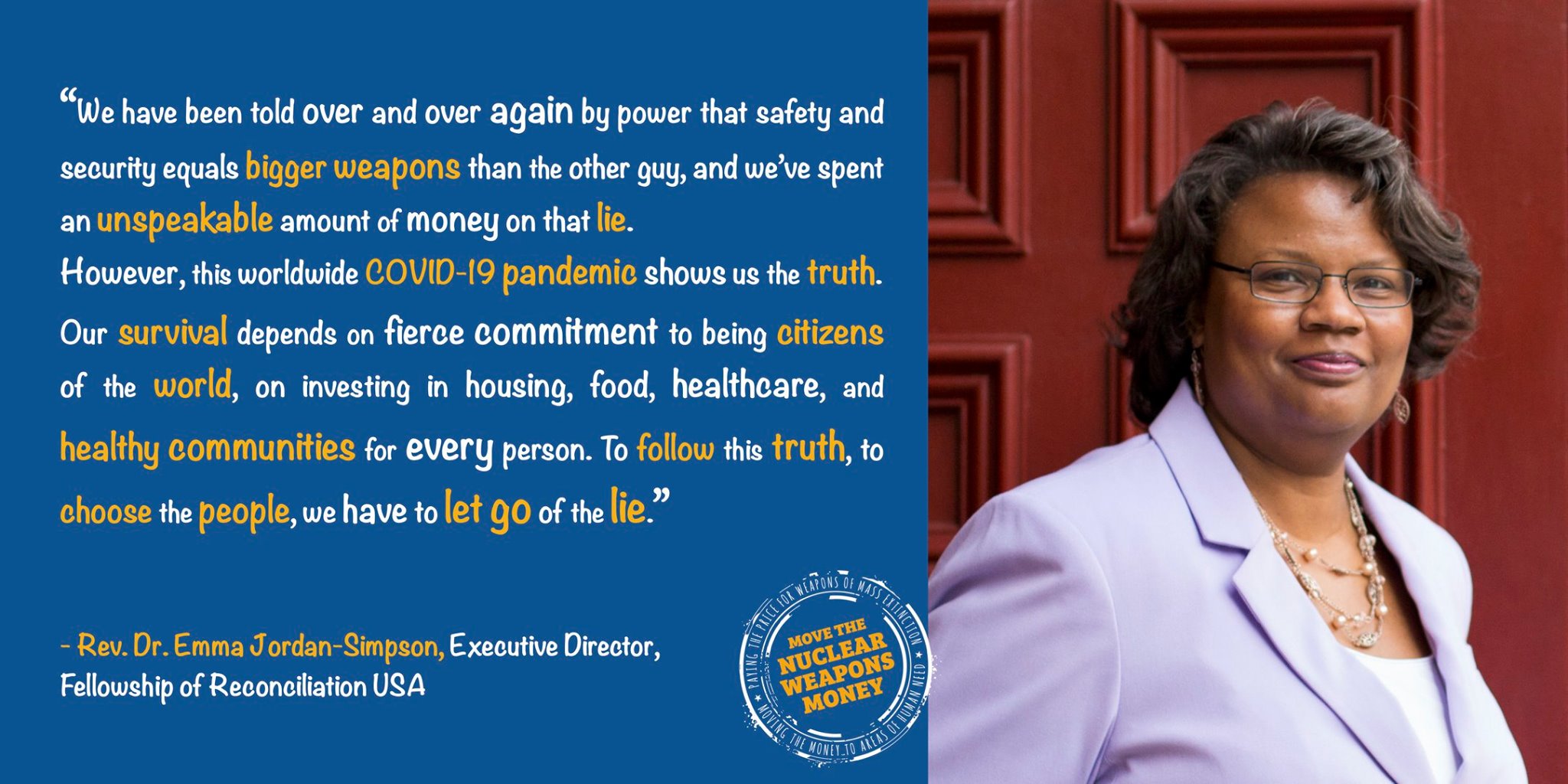Corona-virus Image by mattthewafflecat from Pixabay.
The coronavirus pandemic is sweeping around the world undermining public health, curtailing personal freedoms and causing havoc on our economies.
In an article published in Newsweek on March 17 (‘National security is too crude to protect us from pandemics: It’s time to shift to human security’), Jonathan Granoff (Global Security Institute and Move the Nuclear Weapons Money) writes that this is the kind of threat to human security for which governments should have been better prepared. But instead they have been focusing more on military security, spending trillions of dollars on weapons to defend against military attacks rather than investing in human security issues like health, climate change and poverty.
‘The concept of “security” must be redefined, or at least expanded. For a long time, it has been defined singularly in nationalistic terms, measured by military strength. Many trillions of dollars continue to be spent on weapons to defend nations against threats they pose to each other. Vast institutions have been created around these weapons, and outstanding intellects are dedicating their brilliance to strengthening these institutions and designing strategies for using these weapons—all in the name of national security. But as this pandemic spirals around the world, and as militaries lie helpless before it, it’s appropriate to ask whether we would be better off if more resources and attention were pooled and devoted to addressing threats to human security.’ Jonathan Granoff, Newsweek, March 17, 2020
In June 2019, before the corona virus had emerged, the Sustainable Defense Task Force, a group of former US Congressional and Pentagon budget officials and other experts, released a report ‘Sustainable Defence: More Security: Less Spending’ which noted “[T]he most urgent threats to U.S. security are non-military, and the proper national security tools ought to be non-military as well. [The threats] include climate change, which undermines frontiers, leads to unpredictable extreme weather, and fosters uncontrollable migration . . . global disease epidemics, which pose societal risks to all nations; and income and wealth gaps, which foster insecurity and conflict.”
And in 2018, Microsoft founder and philanthropist Bill Gates warned that the world should be “preparing for a pandemic in the same serious way it prepares for war” (see The Trump administration has made the US less ready for infectious disease outbreaks like coronavirus).
But their warnings and recommendations went unheeded by the US government, which increased military spending in 2019 to $738 billion while cutting the Centre for Disease Control budget by 20% to $11 billion. Code Pink has responded with a campaign to reverse this trend calling on the US government to double the CDC budget by cutting military spending. Click here to support the campaign.

A proposal to use just 1% of the military budget to fund the required measures in the United States to address corona virus and prevent similar pandemics was outlined by Bill Hartung in Forbes magazine, see To Save Lives, Shift Pentagon Spending to Public Health.
In Europe, a number of governments are already discussing possibilities to cut military budgets in order to fund health measures to deal with corona virus cases, and to provide economic support measures to protect jobs and income from the economic fall-out from the pandemic.
However, the military-industrial complex is already gearing up to fight to maintain military budgets. Dov S. Zakheim, a former US Under-Secretary of Defense, in an article in the Hill on March 16 (NATO’s budget virus: How the pandemic could slash military spending), ‘warns’ that ‘One of the first casualties of the virus may well be European defense spending’ and then argues that European defense budgets need to ‘remain a high priority for obvious reasons — that is, close proximity of (an) aggressive Russia…’ and that ‘the major beneficiary of NATO’s travails [reduced military exercises and threats to military spending due to corona virus] will be none other than that soon-to-be constitutionally-engineered president for life, Russia’s Vladimir Vladimirovich Putin.’
To counter the pro-military lobby, civil society action is required to encourage and support governments to support make the right decisions.
Move the Nuclear Weapons Money
Cutting nuclear weapons budgets to address the corona virus pandemic and other threats to humanity such as climate change, is a key focus of the Move the Nuclear Weapons Money campaign. You can help promote the campaign by sending us a short quote (1-3 sentences) plus a photo of yourself which we turn into a social media meme (see above for a sample meme from Rev Emma Jordan-Simpson from Fellowship of Reconciliation). You can also help us invite your local mayor, parliamentarian, religious leaders or celebrities to do a meme for the campaign.
In addition, during the Global Days of Action on Military Spending (see below), we will be running an international webinar on the Move the Nuclear Weapons Money campaign. It will include updates on legislative measures to cut nuclear weapons budgets (such as the SANE Act introduced by US Senator Ed Markey), as well as measures that can be taken by cities, religious communities, universities and non-nuclear governments to divest from the nuclear weapons industry, and re-direct these investments to human security. Contact info@nuclearweaponsmoney.org for details.
Global Days of Action on Military Spending (GDAMS)
From April 10 – May 9, 2020, civil society organizations from around the world will focus specific attention on military budgets and reallocation of public funding to peace and disarmament sectors as well as to public services such as health and education. GDAMS 2020 coincides with Tax Day in the United States (April 15) and the release by SIPRI of their annual report on world military expenditures. Take action during these days to Move the Nuclear Weapons Money or to cut military spending in general.
For more information or to list your action/event, visit http://demilitarize.org/ or contact coordination.gcoms@ipb.org.

